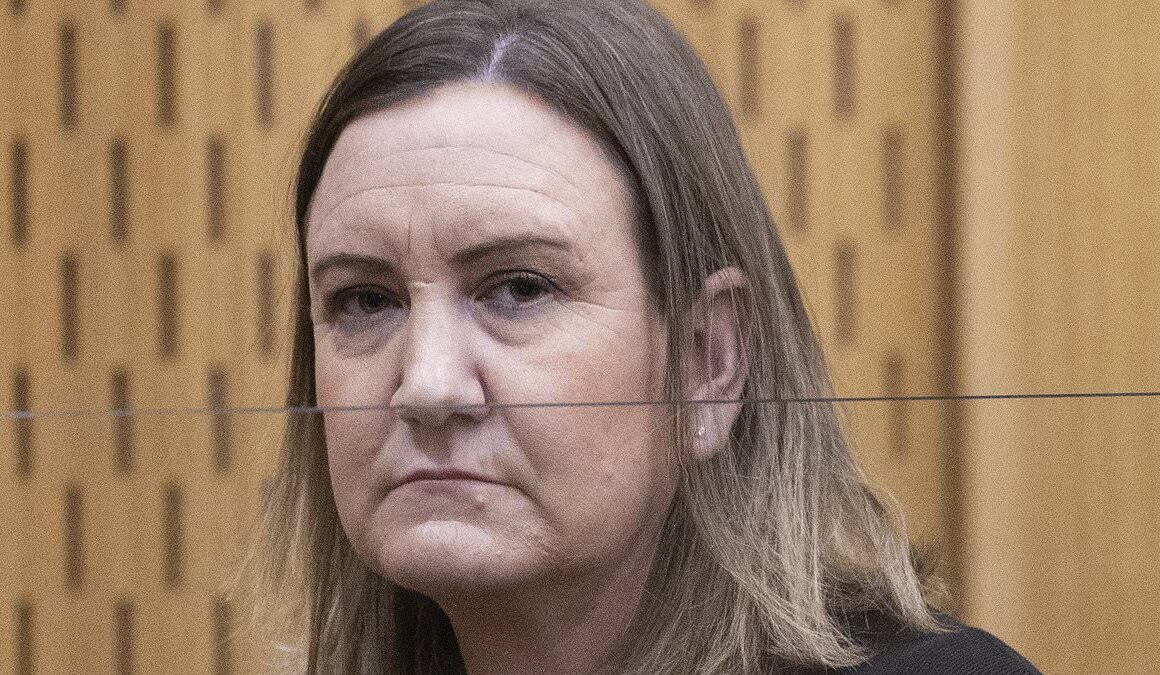A South African mother who killed her three little girls just five days after moving to a quiet seaside town in New Zealand has launched an appeal against her murder convictions.
Lauren Anne Dickason, 41, was recently sentenced to 18 years jail after a jury found her guilty of murdering daughters Liane, six, and two-year-old twins Maya and Karla on September 16, 2021.
Justice Mander did not impose a life sentence on Dickason or declare a minimum time before she could apply for parole as he believed doing so would be unjust due to her poor mental health.
He made an order under the Mental Health Act which detained Dickason as a special patient in Hillmorton Hospital’s secure mental health unit.
It was decided the mother could apply to be transferred to prison for the remainder of her sentence if she was deemed well enough. She currently remains hospitalised.
This was in spite of a jury voting 11-1 that Dickason did murder her children and did not commit the act in insanity or infanticide, where a mother kills her child due to a disturbed mind.
Six weeks on from sentencing, Dickason has appealed against her convictions, the New Zealand Herald reported.
Her legal representatives filed a Notice of Appeal against Conviction in the Court of Appeal on July 23

Lauren Anne Dickason (pictured) was sentenced in June after being found guilty of murdering her three children

Dickason had killed her daughters Liane, six (right), and two-year-old twins Maya and Karla (also pictured) in September 2021 after moving to New Zealand five days earlier

The court heard Dickason (pictured with her husband and daughters) suffered from long-term mental health issues
The grounds for their appeal are not yet known.
If the application is successful, the courts could see a repeat of the highly-emotional five-week trial for the case last year.
No date has yet been set for Court of Appeal proceedings.
Dickason had admitted to smothering her three children to death after she unsuccessfully tried to strangle them with zip tie necklaces.
After their horrific deaths, Dickason had tucked them into their beds and attempted to take her own life.
‘I loved them, I wanted to tuck them in one last time,’ she said.
The court heard the family had spent just five days in their new home in Timaru, 162km south of Christchurch on NZ’s South island, when the mother decided they’d made an inescapable mistake.
She and her husband Graham, both qualified medical professionals, had decided to leave South Africa for a more peaceful life.
However, at the time of their move, Dickason had already been struggling with significant mental health issues, the court heard.
Those issues had been worsened by 17 rounds of IVF, the death of the couple’s first daughter after 18 weeks of pregnancy and their move to New Zealand being delayed by the Covid pandemic.
The family of five spent two weeks in isolation before moving into their Timaru home on September 11 2021.
However, what was meant to be a fresh start for the family was viewed by Dickason as a horrific error.
She hated Timaru and their ‘depressing’ rental home.
She was also worried her daughters would be the target of bullying at their new school.
On the day of the girls’ deaths, Dickason had struggled to get the children to behave and recalled one of the twins biting her clothes during an argument.
She had taken the girls to the local botanical gardens, where she was reportedly warned a boy had been photographing them.
This furthered her belief New Zealand was unsafe for her family.

Dickason (pictured with her family) had tricked her daughters into wearing zip tie ‘necklaces’ before choking and smothering them

The court heard Dickason’s husband (left) knew she struggled with mental health issues but did not believe she was capable of killing their daughters

The family had moved from South Africa to Timaru in hopes of a more peaceful life (pictured, a police forensic team is seen outside the family home in Timaru)
Mr Dickason left his wife alone with their children that night to go out with colleagues.
He later told police he knew Dickason was struggling with her mental health but did not know she was capable of killing their daughters.
Dickason gathered the three girls in a bedroom and tricked them into wearing ‘necklaces’ she’d created from zip ties.
She said she told her daughters: ‘Mummy’s very sick and is going to die. I can’t leave you behind because I don’t know who’s going to look after you.’
After she failed to completely choke them, she used a towel and blankets to smoth them.
The girls were found by Graham after he returned home.
When he confronted Dickason about their deaths, she told him it was ‘too late’ and fell into a catatonic state.
Dickason’s defence lawyer argued the mother had killed the girls due to her declining mental condition.
‘The deaths don’t have anything to do with anger or resentment – and have everything to do with what was a severe mental illness,’ Kerryn Beaton KC said.
‘She desperately wanted these children… and we know that she was a great mum, a loving and protective mother who was highly organised and prepared for every eventuality… she protected them right up until the day they died.’
‘This awful event would never have happened if Lauren Dickason was not depressed – and if she had been treated for her depression things might have been very different. In her mind, it was the morally right thing to do.’
However, prosecutor Andrew McRae argued Dickason ought to still be held fully responsible for what she’s done’.
‘Her actions are explained by two primary drivers – her anger at her children’s behaviour and her need for control,’ he said.
‘Once she started doing what she was doing to the girls there was no turning back. She did not contemplate stopping.
‘Her accounts did not indicate that this was done out of love or that she did this because it was in their best interest. Her action was very much done in a moment of anger… there was no true altruistic motive.
‘She knew she was killing the girls and she proceeded regardless.
‘She must have known what she was doing was morally wrong if she was worried about the possibility of discovery… she made efforts to clean up the scene.’

Dickason (pictured during a police interview) claimed the move had been a horrific mistake which she saw no way out of

Dickason claims she believed her family (pictured) was in danger in New Zealand and wanted to return home
Dickason had told the court she was ‘disordered’ when she killed her daughters as ‘everything was unravelling’.
‘I was so out of control trying to figure out in my head how to get back to South Africa,’ she said.
‘I didn’t want to hurt my children – I wanted them to be with me … I was feeling we’d make a huge mistake … impossible to extricate from … I felt helpless and hopeless.’
Justice Mander found the murders were ‘committed with a high level of brutality’.
‘Sentencing a parent for the murder of three children is unprecedented … not only were the children vulnerable because of their age but they were entirely dependent upon you as the mother who they look to for care and protection and would have viewed you as an unconditional source of safety and love,’ he said.
‘The ending represents a fundamental breach of trust … However, I do not consider you were lashing out or venting your anger at the children … the systematic and methodical way you did that does not support a finding that you were simply an angry mother.’
Justice Mander instead contributed the mother’s actions to a major depressive disorder.
‘You genuinely believe they would be better off dead because you saw no future,’ he said.
‘I am satisfied … the tragic event would not have occurred but for the major depressive episode from which you were suffering.
‘… You saw the only way out as being suicide in which the children had to join you in death … you somehow perceived the children’s deaths as a means of alleviating a source of stress and despair or some combination of both.
‘There is a direct causal connection between your mental illness and your offending, which significantly reduces your moral culpability as a result.’
Days after the sentencing in June, Dickason shared a ‘note’ for her supporters on a social media page after previously detailing sleeping with teddy bears made from the girls’ clothing.

Dickason has applied an appeal to her 18-year sentence, which will be partially complete in a mental health unit

Dickason’s legal representatives filed a Notice of Appeal against Conviction in the Court of Appeal on July 23 but the grounds for their appeal are not yet known
‘Yesterday was a win for maternal mental health. Justice Mander heard me. His decision is fair and just,’ it said.
‘Thank you for believing my version of events – that I am not an angry, jealous and selfish person; but rather a mother suffering from a severe mental illness while trying to raise my three beautiful little girls and supporting my husband in all his endevours [sic].
‘Be kind to yourselves and talk until someone hears you. Do not be ashamed to admit if you can’t cope.
‘There is a way out which doesn’t have to end in tragedy.’
For confidential 24-hour support call Lifeline on 13 11 14 or Beyond Blue on 1300 224 636.









